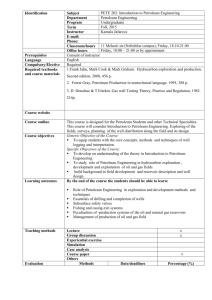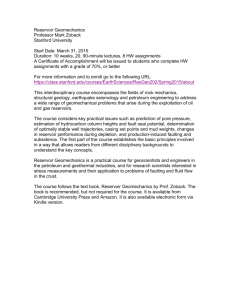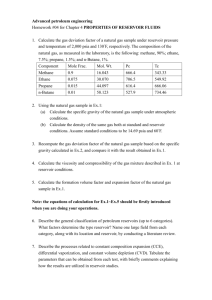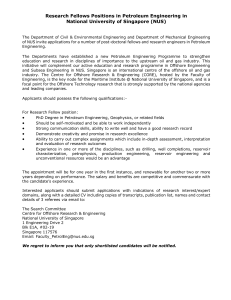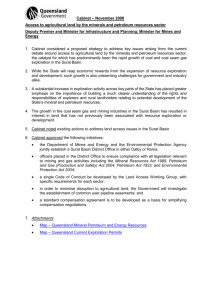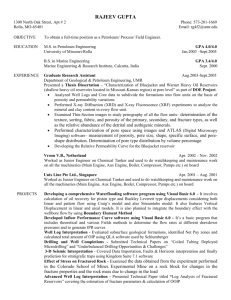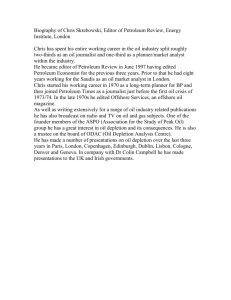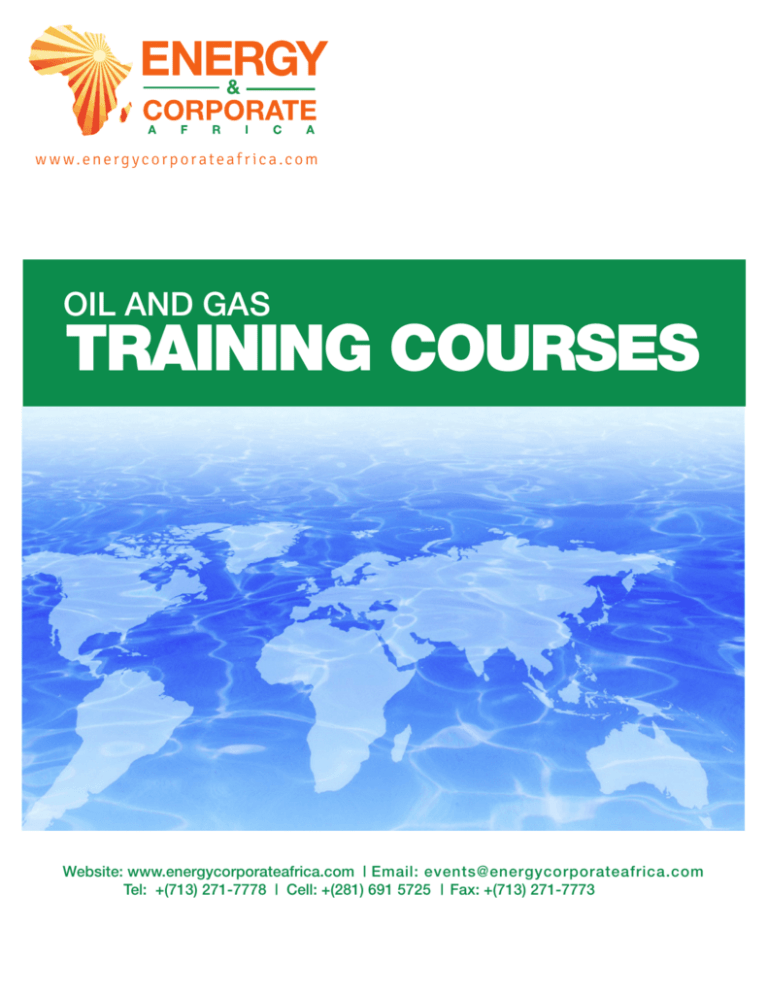
&
w w w.energ ycor por ateaf r ica .com
OIL AND GAS
TRAINING COURSES
Website: www.energycorporateafrica.com | Email: events@energycorporateafrica.com
Tel: +(713) 271-7778 | Cell: +(281) 691 5725 | Fax: +(713) 271-7773
What’s Inside / A Closer Look
At Energy & Corporate Africa
What’s Inside
1.
What’s inside / A Closer Look
at Energy & Corporate Africa
2.
A Closer Look at Energy &
Corporate Africa
3.
Fundamentals of International
Joint Ventures and Partnership
4.
International Oil and Gas
Management
5.
Legal Risk and service
contracts in the Oil and Gas
Industry.
8.
Fundamentals of Hydrocarbon
Exploration
9.
Reservoir life-cycle
10. Production Engineering
11. Reservoir Engineering
12.
Reservoir Simulation
13.
Offshore Marginal Field
Development
15.
Global Trends on Gas
Monetization
16. Training Instructor profile
A Closer Look at
Energy & Corporate Africa
Energy & Corporate Africa, is a “Total Solution”, Training and
Consulting Agency in the rapidly expanding African Oil and
Gas market. We are dedicated to enhancing human capital
development, through our strategic business approach.
We offer expert consulting services, geared towards skills
acquisition, continuous improvement and total human
resource development in the emerging African
Oil and Gas field.
We strive for long term excellence in news and market
analysis, uniquely designed training and conferences,
Project Management, and market development strategies,
to gain, capacity building and performance enhancement
in the African Oil and Gas sector. We map out improvement
opportunities in your organization while increasing your
effectiveness and revenue Dedicated to a “Total Solution”
approach in maximizing the benefits from Africa’s Oil and Gas
resources, for quality human capital development.
Energy & Corporate Africa firmly believes that humans are the
greatest asset to any nation and organization. Therefore, the
importance of building a quality human capital base cannot
be overemphasized. Africa is undeniably wealthy when it
comes to natural resources.
2
A Closer Look At
Energy & Corporate Africa
These resources open up a stream of public revenue and
national wealth. With strategic consulting and training services
from Energy & Corporate Africa, your business can tap into the
economic boom with growth, socio-development, and equitable
returns on investment. We showcase a “Rising Africa” from
a global window, providing educational materials, and vital
information that will guide investors into this rich market.
Our Flagship, the annual Sub Saharan Africa Oil and gas
conference in Houston, and other workshops and trainings
have become one of the most attended events for those who
want to become pace setters in the growing African market.
These events showcase available investment opportunities in
the region’s market. Attendees can take advantage of excellent
networking opportunities with national officials, top industry
players, decision makers and core investors.
We use a “Total Solution” approach of Market advice,
commentaries, research and analysis to deliver sustainable
results. Our team of experts understand the bulging African
market and its interaction with the global market, so with unique
advice and strategic training, we have a solid history of results
with companies across the Oil and Gas industry. We propel a
people-driven economy which will strengthen African producers
in a competitive global market.
Energy & Corporate Africa also utilizes the media of journal
publications; online news, commentaries, analyses and
strategic reports on Africa to enable governments, institutions,
organizations, foreign investors and interested individuals
in making proper decisions towards achieving their various
goals. We comment, report and analyze Africa from a unique
perspective and broader window, through ethical and logical
journalistic approaches, collaborating the views/expectations
of the African people and that of the industries/institutions to
create a balance. Our media outlets create positive exposure to
companies and organizations that use it in creating awareness
to clients and strategically accomplishing their corporate goals.
3
Fundamentals of International Joint
Ventures and Partnership
Fundamentals of
International Joint Ventures and Partnership
This course is designed to equip professionals in the petroleum industry, managers, executives and government advisors with vital
knowledge in implementing successful joint ventures and partnerships in the oil and gas industry. Participants will learn essential
information that will guide them in navigating through the various important stages of joint ventures for harmonious partnership and
optimization of goals. This course is interactive and also based on presentations, case study analysis, contracts and agreement analysis.
Course Outline
•
•
•
•
•
•
•
•
•
•
•
•
•
•
•
•
•
•
•
Introduction to the oil and gas industry
Review of contracts and life cycles in oil and gas operations
The role of joint ventures in oil and gas industry
Why nations and companies enter into joint ventures
Industry trends and changes that impact joint ventures
Strategies for partnering and partnering models
Alliances, partnerships, and joint ventures
Incorporated and unincorporated joint ventures
Concession, petroleum Sharing Contract, Service Contract, Drilling Contract, Farm-Out
Chain joint ventures
Joint venture operations – successes and failures
Setting up joint ventures, essential agreements, issues, negotiations
Managing joint ventures and funding
Cultural differences, conflict resolution
Petroleum laws, local content policy and various government regulations
Foreign Corrupt Practices Act (FCPA)
Other Trade Regulations
Joint venture operating principles and performance management
Examples of successful and failed joint ventures and lessons learned from them
Who should attend:
Commercial managers, contract, finance, engineering, operation managers, lawyers, government advisors,
and also personnel involved in operation joint ventures.
Course Duration:
3 days
4
International Oil and Gas
Management
International
Oil and Gas Management
To be efficient and effective an oil and gas manager should have a good understanding of the industry. The manager should understand
the relationship of the various value chains and their roles in the company. An effective manager is also required to carry out soundly the
principal functions of management which entails: organizing, planning, pleading and controlling.
Oil and gas industry involves lot of assets which are to be managed effectively for the organizational goals and bottom –line to be met.
These assets could range from tangible and intangible. At any given time in the process of operation, it is essential for managers to be
aware of the integrity, readiness, availability and location of these assets to be able to put them into maximum use and ensure
successful outcome.
This course is designed for line and assets managers to provide the tools to manage the various resources and assets of the company
at their disposal effectively for production optimization. The course involves presentations, interactions, case study analysis and
simulations. Participants will learn from experts with proven experience in managing complex oil and gas assets
Course Outline
• Introduction to oil and gas
• Changing trends in the industry and its impact on the market
• Exploration and Production processes
• Laws, regulations and frameworks governing E & P ( in the context of focused countries )
• Management functions: organizing, planning, leading, controlling
• Strategic planning, Team building, Team management, Conflict Resolution
• Asset management
• Asset integrity management ( management of complex networks of critical assets )
• Proactive asset management, geo-spatial asset management, workforce or human capital management, quality management, capacity building, performance enhancement
• Finance, Hydrocarbon accounting
• Economic Risk
• Mergers , acquisitions & Divestments (MAD)
• Leadership, Fundamentals of Crisis Management
• Technology, Information technology
• Health Safety, Environment and Security
• Business simulation
Who should attend:
Line managers, asset managers, project managers, supervisors, those aspiring to be promoted to management position,
new management recruits transferring from another industry
Course Duration:
1 Week
5
Legal Risk and service contracts in the
Oil and Gas Industry.
Legal risk and service contracts in the
Oil and Gas Industry
The Macondo blowout or Deep Water Horizon oil spill in the Gulf of Mexico was a major disaster that caused loss of lives, equipment and
revenues. The disaster generated avalanche of litigations among BP (Operator), Transocean (Rig owner), Halliburton (Service Company)
and other parties including Gulf States in the United States of America.
Compensations amounting up to billions of dollars are been paid out, and some parties involved may not be adequately compensated
due to various reasons. The Deep Water Horizon situation has brought about many questions in law, risk management and insurance
facilitation in the petroleum industry and beyond. When event such as the Macondo blowout occurs, who will bear the risk? Such disaster
often involves loss of lives, those that will be crippled for life, debilitating injuries, medical expenses, payment to survivors, physical
equipment damage, replacements, loss of revenue, etc.
The big question that often leads to litigation, if not well handled is:
WHO TAKES CARE OF WHAT?
HOW WILL THE RISK INVOLVED BE SHARED?
The knowledge of what to do helps in planning ahead and making sound management decision.
For instance in the case of environmental pollution where a fishing ground is destroyed, it becomes important to determine who is injured
and for how long. Is it the community, country, or people whose livelihood depends on fishing? How would parties involved take care of
consequences of events (extra ordinary) through insurance? For example if a platform is destroyed, will insurance cover cost of destroyed
platform, cost to build new one, and loss of production for time spent?
This training course is aimed at equipping participants with various legal and insurable risk involved in service contracts, and tools
to manage such risk and also get them prepared for consequences when questions start coming. The overall interest is to protect the
company’s health, fairness to stakeholders, ensure adequate risk distribution, compensation ensure creation of values without
fears of litigation.
6
Legal Risk and service contracts in the
Oil and Gas Industry.
Course Outline
•
Introduction to Exploration & Production in Petroleum Industry •
Changes Affecting the Industry
•
Contracts and Fiscal Terms in the Oil and Gas Industry
•
Description of Master Service Contract
•
Why Master Service Contracts are used?
•
Major Provisions of Master Service Contracts
•
Allocation of Liability & Risk
•
How do you risk operators?
•
Risk Analysis, Identification, Evaluation, Management
•
Role of Insurance
• Arbitration & Clauses
• Choice of Law
•
Contract Integration
•
Perspectives of Operators/ Service Companies
•
Offshore: Maritime Charters
• FPSO, Vessels, FPU
•
Kinds of vessels and roles
•
Insurable Risk on vessels and Equipment
•
Insurable Risk on Processes
•
Simulations
•
Environmental Risk
•
Issues – fire, Insurrection, war, earthquake, storm, security threat
•
Normal Risk – Storm, Hurricane
•
Extra –Ordinary Events – Terrorism, war
•
Risk management and value creation
Who should attend:
•
•
•
•
•
•
Directors, senior management of all spheres, finance, operations, marketing managers, accountants
Lawyers ,Insurance executives and managers, Investment bankers, commercial bankers,
Commercial managers, contract managers
Production Directors, Engineers, Geologist, Field Supervisors, Project Managers, Safety Directors/Managers
Economists, transaction advisors
Anybody that is involved in managing service contracts and Legal risk in the oil and gas industry
Course Duration:
5 Days
7
Fundamentals of
Hydrocarbon Exploration
Fundamentals of
Hydrocarbon Exploration
Prospecting and exploration fall within the first step for finding oil and gas. Understanding of geological processes that are relevant for
the formation of oil and gas are the fundamental knowledge that geologists working for oil and gas companies or governments should
have. Added to the essential knowledge is the need to understand various stages involved in exploration work flow, skills and knowledge
of vital tools used in hydrocarbon exploration. This course which entails instructions, case studies, hands-on exercises on various
modeling, touches the length and breadth of hydrocarbon exploration. Computer is required for this course.
This course discusses the fundamentals of all aspects of petroleum exploration.
Course Outline
•
•
•
•
•
•
•
•
•
•
•
•
•
•
•
•
•
Basin Analysis – understanding basin and mechanisms of basin formation
Basin Classification, Basin and Sequence Stratigraphy
Interpreting basin stratigraphy, Prospectivity
Global Tectonics – Tectonic Theories
Plate Tectonics – passive continental margins, continental convergent margins, continental collision margins,
accreted terrance margins
Geological Prospecting – Characteristics of deposits, prospecting indicators
Geological Exploration – Physical Properties
Geochemical Exploration
Maturity Calculation
Assessment of source rock
Petroleum System Modelling
Predicting fluid type (oil or gas) Volumes, Composition & Quantifying Risk/Uncertainties
Prospectivity Ranking of Basins, Plays & Prospects
Exploration Economics
Exercise and data integration
Global trends affecting hydrocarbon exploration
Summary
Who should attend:
Geologists, Geophysicists, Exploration Team Leaders, Exploration Managers
Course Duration:
1 Week
8
Reservoir life-cycle
Reservoir life-cycle
Petroleum Production and Exploration
Participants in this course will acquire basic knowledge of all phases of the reservoir life-cycle, starting from the exploration phases,
including principles of geology and geophysics, to the appraisal and production phases, including risks and economics assessment and
basic reserves quantification.
Course Outline
•
Reservoir Life-Cycle: exploration, appraisal, field development, field production (principles of geology and geophysics; hydrocarbon compositions and final products)
•
Basic Geology for Petroleum Engineering
•
Basic geophysics
•
Principles of oil exploration
•
Oil exploration economics - reserves
•
Drilling and well construction/completions
•
Production monitoring; Surface Facilities and equipment
Who should attend:
Geologists, Geophysicists, Exploration Team Leaders, Exploration Managers
Course Duration:
1 Week
9
Production Engineering
Production
Engineering
The objective of this training course is to introduce production engineering concepts following the fluids as they enter the well from the
reservoir and then flow through the well to surface flowlines and to surface facilities. The course introduces the theory and practice of
well deliverability and injectivity, and the predictions at which the rate the well should be capable of flowing,
Course Outline
•
•
•
•
•
•
Geological aspects of reservoir properties
Well performance and multi-phase flow in pipes – multi-phase flow in pipes, well-bore performance, well deliverability: productivity and injectivity; formation damage
Well hardware and completions
Well simulation: Production improvement with skin removal, acidizing, matrix acidizing; sandstone and carbonate acidizing
Hydraulic fracturing for well stimulation; hydraulic fracture design, production optimization; horizontal technology
Production equipment; well hardware and completions; smart well technology; surface facilities, separation systems;
transportation systems; artificial lift methods
Who should attend:
Engineers, Geologists, Employees new to the field, Geologists, Engineering Team Leaders, Engineering Managers
Course Duration:
5 days
10
Reservoir Engineering
Reservoir
Engineering
The objective of this course is the development of a more complete understanding of the fluid flow in porous media, covering reservoir
flow mechanisms, primary production, secondary production (water flooding) to tertiary mechanisms, namely enhanced oil recovery
(EOR). The participants will learn the basic analytical and computational tools in reservoir management. Dracy’s flow, multi-phase flow
and material balance equations are emphasized. Also, the principles of integrated reservoir management will be discussed.
Course Outline
•
Introduction to reservoir engineering; reservoir life-cycle, reservoir environment and formation properties; fluid contacts and
relative permeability; fundamentals of fluid phase behavior
•
Fundamentals of fluid flow in porous media - The mathematics of fluid flow in porous media; conservation and Darcy’s equation;
development of diffusivity equation; well testing technology; flow regimes and diagnostic plots; decline curve techniques and
material balance
•
Recovery mechanisms, water flooding techniques; coning and cusping issues; water influx
•
Enhanced oil recovery mechanisms; EOR screening; Gas injection as miscible and immiscible displacement; CO2 injection; Chemical EOP ( Polymer and Surfactant injection)
•
Reservoir simulation techniques; Data integration; Integrated reservoir management, subsurface and surface coupling
Who should attend:
•
•
Geologist, Geophysicist, engineer, petrophysicist, production engineer
Reservoir engineer, exploration and 20
production engineer, leaders, research personnel
Course Duration:
5 days
11
Reservoir Simulation
Reservoir
Simulation
The objective of this course is to lay down theoretical foundations and practical applications of reservoir simulation using industrialstrength commercial reservoir simulation software; emphasis on reservoir description, data preparation, reservoir model selection,
model initialization and calibration; production forecasting and optimization. ECLIPSE 100 or CMG IMEX will be the main software
utilized in this course. Prior experience with ECLIPSE/CMG is not required. Course Outline
•
Introduction to reservoir simulation
•
Mathematics of reservoir simulation; Formulation of the equations (partial differential equation, solution process – IMPES, fully
Implicity, Explicity, Linearization)
•
Data required and preparation: Reservoir gridding ( Cartesian Structured, Unstructured); Fluid and rock properties (PVT,
properties distribution); Faults modeling; interpreting the results
•
Model initialization, single well modeling, conning effects; Local Grid refinement; Modeling fractures and Hydraulic Fractures
•
Model Calibration and history Matching; Understanding uncertainty (properties); Manual vs Assisted history matching;
•
Production optimization and uncertainty analysis; Complete reservoir study – Course project
Who should attend:
Geologists, petroleum engineers, well engineers, even those with a non-engineering background, especially who require an awareness
and understanding of the components necessary to evaluate oil and gas accumulations.
Course Duration:
20
5 days
12
Offshore Marginal Field Development
Offshore Marginal
Field Development
The history of oil exploration includes the natural evolution from land to offshore to deep water offshore. Underneath a vast majority
of the oceans, in 500 ft. to 10,000 ft. water depths, oil and gas fields have been discovered with some of them developed and producing
millions of barrels of oil. The Golden triangle of this deep water production is the Gulf of Mexico, Offshore Brazil and Offshore West
Africa. More deep water oil and gas fields have been discovered in these three areas than all the rest of the world’s deep water regions.
However, there have been a large number of deep water fields that will not be discovered for years to come, even with high oil prices.
Why? Another reality is geophysics and geological analysis shows there are even more deep water fields, probably a greater number than
have been discovered, yet to discover. Yet the vast majority of these fields will not be drilled. Why? The simple answer to both questions
is that conventional perceptions of reserves and deep water technology, costs, time, and the deployment of human resources continue to
limit the development of these deep water fields.
Course Objective
•
To provide participants insight on why billions of barrels of deep water marginal oil and gas fields, already discovered, will not
be developed in the foreseeable future. It will also address solutions on how these fields could be developed beyond the
conventional method and by using unconventional technologies.
•
To touch on issues why companies will not pursue a great many hot prospects for exploration in deep water when the prospects
look too small. The bottom-line is: most concession holders of what is considered marginal oil and gas deep water fields will not
exploit these fields to commerciality.
•
To provide participants with an overview of advantages/disadvantages of conventions/non-conventional methods for offshore
marginal field development through comparative analysis of both methods.
•
To introduce economically viable innovative solutions for testing and production of shallow deep water oil wells. In its unique approach will make comparisons on conventional and non-conventional approaches and other methods for exploiting what is
considered marginal deep water prospects, both discovered and yet to be discovered.
•
To evaluate potentially best option for the development of ANY OFFSHORE MARGINAL FIELD, taking all things into
consideration.
•
To create a feasible exploitation module for ANY OFFSHORE MARGINAL FIELD, through economic analysis and evaluation of
technologies and methodologies.
•
To present approaches on using existing reservoir to exploit other potentials.
13
Offshore Marginal Field Development
Course Objective Cont.
•
To evaluate a field development plan for offshore marginal field using small FPSO and vessels – matters for consideration to
include, but not limited to:
(A) Gas capture, utilization and commercialization
(B..) Choice of technology
(C) Environmental concerns, both in terms of technology and materials
(D) Up-side potentials, optimization and scale up
(E) Safety
(F. ) Approach to improved recovery etc.
•
To initiate a preliminary field development approach using the experience and technology of the course providers.
Course Outline
•
Overview of the oil and gas industry, fundamentals of exploration and production of oil and gas
•
Global trends and changes affecting the oil and gas industry
•
Designing and development of reservoir
•
Delineation of other reservoir similarities
•
Segmenting a generic offshore field development plan considering the following outlines:
SUBSEA - Geology & Geophysics, Reserves Evaluation, Petrophysics, Reservoir Characterization, PVT Analysis
& Simulations, Depletion Strategy
SURFACE – Drilling & Completions, Production Facilities and hydrocarbon Evacuation, HSE operations and Economics
•
Technologies for efficient development of oil and gas from ANY OFFSHORE MARGINAL FIELD, such as tie-back, gas
re-injection for WAG. Geological storage, floating LNG, Offshore gas liquefaction, etc.
•
Commence Workshop approach. Talking Points:
The Challenges of Developing Marginal Deep Water
•
•
•
•
Oil and Gas Field
Expediting Exploration and Development of Deep Water Fields in West Africa
Early Deep Water Fields Testing and Production
Making Offshore Marginal Fields Economically Feasible
•
•
•
•
•
•
•
•
Evaluating for early testing and production of oil and gas
Conventional and non – conventional technologies
FPSO, mini – FPSO, Small vessels
Review of West Africa Marginal Oil fields
Typical Cluster of West African Fields
Field Development Strategy based on what was learnt from early testing and production of oil and gas
Economic Analysis for conventional and unconventional technologies
Actual Field Development Comparison - incorporating actual data from ANY OFFSHORE MARGINAL FIELD, to develop a possible preliminary plan taking into consideration technological limits, gas utilization/
commercialization, and improved
recovery techniques and complete with economic modeling and optimization.
•
Review all the options/outcomes
Review of all course outline and problem sets
Integrate solutions acquired from solving problems with lessons learnt
Summary and Conclusion
•
•
•
Who should attend:
•
•
Geologist, Geophysicist, engineer, petrophysicist, production engineer
Reservoir engineer, exploration and production engineer, leaders, research personnel
Course Duration:
1 Week
14
Global Trend on Gas Monetization
Global Trend on
Gas Monetization
The idea of turning waste to riches and minimizing environmental pollution and litigations caused by flagrant flaring of gases in most
oil and gas producing countries have led to the latest revolution in the oil and gas industry known as: Gas Monetization. This course is
designed to be interactive and to provide a broader knowledge to participants on the philosophy, consequences and economic benefits of
gas monetization.
Course Outline
•
•
•
•
•
•
•
•
•
•
•
•
•
Overview history of oil and gas/ Energy Mix
Natural Gas History, Exploration & Production
World Natural Gas Reserves and Production
Global Gas Market
Future of Gas in the Global Energy Mix
Gas Flaring – Economics, Environmental, Health & Safety
Gas Uses – Power Plant, Fertilizer, LNG, etc.
Overview of oil and gas law
Environmental law
Government Policies and regulations impact gas monetization
Gas Pricing, Contractual Agreement
Global Gas Demand & Supply
Changing trends in Gas market
Global Best Practices
Who should attend:
•
•
Non –Technical Managers, directors, Supervisors, Commercial Managers, Lawyers
Any personnel that would benefit from this course
Course Duration:
3 days
20
15
Managing Risk and Crisis at the Project Level
Managing Risk
and Crisis at the Project Level
We live in an era of drastically increased competition for available oil and gas. This has produced great price volatility, concern over
oil security and sometimes loss revenue to operators and nations. Dwindling oil reserves in some regions, well maturation, drastically
increased demand from economic giants and political instability in some of the producing regions affect the oil industry. Crisis on its
own can disrupt projects and production. Most of the time crisis does not come out openly to announce that it is about to happen.
Managers, supervisors and team leader should always be at alert and prepared to manage crisis and at the same time managing risk
at all levels of project. This course focuses on how oil and gas industries can avert and respond to these trends to maintain
productivity, survival, and also remain good neighbors through proper risk and crisis management at the project level.
This course entails discussions, presentations, case studies and team work.
Course Outline
•
•
•
•
•
•
•
•
•
•
•
•
•
•
•
•
•
•
•
•
•
•
•
•
Current trends in the oil and gas industry
Understand project phases in exploration and production
Defining and understanding risk in the oil and gas industry
Identify risks and develop risk mitigation strategies
The impact of geopolitics on exploration, production and trading of oil and gas
Political risk analysis, contract management, enterprise management, Joint venture management
Understanding the roles of national oil companies and relationship with other operators
Understand petroleum laws and local content policy, corporate social responsibility
Finance controls, business process controls, IT process controls, Operational process controls
Oil and gas project management
Infrastructures
Human capital management
Health, Safety, Environment
Economics analysis
Improvement of asset management
Business process efficiency
Define and understand crisis at project level and how to manage it
Understanding and apprehending crisis
Setting up team,
Solutions for crisis management
Facing the media during crisis and knowing what to say to all stakeholders
How to benefit from crisis management
Case Studies on risk and crisis management in the oil and gas industry
Successful and failed risk and crisis management
Who should attend:
•
•
Managers, project managers, engineers, , geologists, production staff, supervisor
Asset managers, public relations senior personnel, contract managers and any personnel that
will benefit from this training
Course Duration:
4 days
20
16
16
Effective Public Relations & Community Crisis Management
Effective Public Relations
& Community Crisis Management
in the Oil and Gas Industry
The oil and gas industry is growing on daily basis and has become a paramount driver of the global economy. Amid the surging growth
in the industry and importance are herculean challenges that public and community relations face in the industry. These challenges
are both internal and external. Today, management of oil and gas companies no longer report to their stockholders alone but to
stakeholders – stockholders, employees, community where the companies operate, etc. This has increased the role of public and
community relations professionals in the industry. The great shift in paradigm on how the oil and gas industry is operated makes it
to be prone to crisis. As crisis manifest in the oil and gas industry, public relations personnel as the spokespeople of the organization
alongside management have a crucial duty to perform in order to be alert, responsive, make the organization to recover from crisis,
turn those crisis into opportunities, maintain corporate governance and ensure robust community relations as good neighbors.
This course will equip attendees with tools and strategies for effective public and community relations in the oil and gas industry.
It will enable attendees to identify the challenges of PRs and crisis management in the industry and how to effectively apply PR/
Community Relations in managing crisis. This course involves presentations, instructions, case studies and role – play
Course Outline
•
•
•
•
•
•
•
•
•
•
•
•
•
•
•
•
•
•
•
•
•
•
•
•
•
•
•
•
•
•
•
Overview of the history of oil and gas, global trend affecting the industry
Exploration and production processes in oil and gas
Public participation in the oil and gas industry
The role of public relations in the entire value chain of oil and gas industry
Identify key issues and challenges of public relations in oil and gas industry
Managing public relations challenges
Stakeholders effect on public relations
Strategies of effective public relations
Legal elements and public Relations
Principles used by PR practitioners to plan and implement communication campaign
The role of internet, social media, email, twitter, blogs, television, newspaper, etc
How to identify and reach your audience
Learn how to generate good publicity, address negative perceptions/ publicity
Corporate governance, legal frameworks & impact of petroleum law on public relations
Understand the role of public relations is crisis management
Definition an understanding of community
Oil bearing community and crisis concept
Perception of oil companies by oil bearing communities, characteristic of oil bearing communities,
attitude of oil bearing communities
Types of industry/ community crisis in oil and gas producing areas
Causes of community crisis in oil bearing areas
Guidelines for effective community relations
Local content policy, Corporate social responsibility
Crisis communication to the public
Preparing for interview or giving public statement during crisis – what to say and not to say and how to say it
Understand and prepare for crisis stress levels
Manage crisis
Diversity in setting up your public relations and crisis management team
Turning crisis to opportunities/benefits
Effect of politics on public relations/crisis management
Environment, community relations, public relations and crisis management
Case studies
Who should attend:
•
•
Managers, project managers, engineers, , geologists, production staff, supervisor
Asset managers, public relations senior personnel, contract managers and any personnel that
will benefit from this training
Course Duration:
4 days
17
Training Instructor profile
Meet the
Training Instructors
At Energy and Corporate Africa, we employ the services of quality and knowledgeable instructors who have more than 25 years of
education, and industry experience. These instructors have displayed outstanding qualities and won various educational and industry
related awards. Their knowledge and passion for their filed of study make them exemplary, and fit to train, teach, and certify.
Dr. Keith Milheim
Director at MEPS – First Oil Ltd, Nautilius LLC
Dr. Keith Millheim received Ph.D. in Mining from university of Loeben in 1992 and M.Sc in Petroleum Engineering the University of
Oklahoma in 1964 and B.Sc in Petroleum Engineering from Marietta University in 1963. Keith is the youngest member of the U.S.
Engineering Academy. Millheim is currently the president of Strategic Worldwide LLC, a company that provides advisory services to
international oil and gas companies on new innovative ways for oil and gas exploration and production. Strategic Worldwide is now
focusing on innovative ways to reduce costs for oil and gas exploration and development in the Arctic areas of the world and in deep
water. Dr. Millheim retired as a Distinguished Advisor for Anadarko Petroleum Corporation, the highest technical position in the company.
Before this position, he was the company’s chief engineer for technology. Dr. Millheim has developed many innovative technologies
in drilling.
Prof. Eduardo Gildin
Assistant Professor (TAMU) C.J. Craft Jr. Faculty Fellow
Dr. Eduardo Gildin is an Assistant Professor of Petroleum Engineering at Texas A&M University and holder of the CJ Craft Jr. Faculty
Fellowship in Petroleum Engineering. Dr. Gildin holds a PhD in Aerospace Engineering from the University of Texas at Austin and has
held Postdoctoral Fellowships from The Institute for Computational Engineering and Sciences (Center for Subsurface Modeling) at
The University of Texas at Austin and from the Electrical and Computer Engineering at Rice University. As a lecturer, he has taught
undergraduate classes on Control Systems and Flight Dynamics, and graduate classes on Model Order Reduction, Finite Element
Methods, and Reservoir Simulation
18
Training Instructor profile
Tosin Famurewa
International Education
Tosin Famrewa has a MS degree in petroleum engineering from University of Southern California, a BS degree in chemical engineering/
material science and engineering from University of California at Berkeley. He has various industry sponsored short courses in
production, reservoir and facilities engineering, economic and decision analysis, and management. His professional associations include
Licensed Professional Engineer in the State of Texas, Committee Chair, Houston Mayoral Advisory Board on International Affairs and
Development Member, Society of Petroleum Engineers Member, Houston World Affairs Council Member, and Pi Epsilon Tau Honorary
Fraternity. His Seminar and conference teachings include Speaker, �4th Sub-Saharan Africa Oil and Gas Conference�, Houston, Texas.
Topic: Impact of Fiscal Terms on Reserves Bookability. 2011. Speaker, University of Southern California Ci-soft Academy.
Los Angeles, CA. 2006. Speaker, Energy Center Houston Museum of Natural Science Seminar, Houston, TX. 2005. Speaker, Annual
National Engineers week, Bakersfield, CA. 2003/04.
Guest Lecturer, �Introduction to Engineering�, Bakersfield College, CA. 2003.
Participant, National Eagles Leadership Institute Awards (NELI) Gala, Beverly Hills, CA. 2003.
Speaker, West Coast INROADS Banquet. Bakersfield, CA. 2001.
Dr. Nirajan Banik
Scientific Advisor WesternGeco Schlumberger
Dr. Niranjan C. Banik is a Scientific Advisor with the Integrated Solutions Group of Schlumberger-WesternGeco in Houston, Texas. He
has been in the oil industry for 28 years, working as an application geophysicist. He has previously worked for Gulf Oil, Arco Oil and Gas,
T. D. Williamson, Inc., Texaco, and Unocal. During the last several years, Dr. Banik has been concentrating on integration of multiple
geophysics disciplines for hydrocarbon exploration and exploitation in complex environment and in unconventional reservoirs. He has
authored many papers on anisotropy, stratigraphic filtering, AVO and inversion, and pore-pressure Prediction. He received his Ph.D. in
physics from Purdue University, West Lafayette, Indiana.
19
Training Instructor profile
Mark Miyaoka
TerraData Geosciences Mark Miyaoka currently serves as the Chief Executive Officer for TerraData GeoSciences (TDGeo), where he is actively promoting Depth
Imaging services as well “Solving Depth Issues in Time”. Before his current position, Mark served as the Vice President of Strategy and
Business Development. Prior to TDGeo, Mark served as the Director of Strategy and Business Development for Resolve GeoSciences, Inc.,
where he was responsible for developing innovative ways to apply 3D seismic multi-attribute responses to solve a variety of exploration
challenges. Mark also served as the North American Sales Manager for Rock Solid Images, where he was actively involved with clients
to apply Rock Physics Diagnostics and 3D seismic Pre-Stack Simultaneous Elastic Inversions to discriminate fluids as well as identify
hydrocarbon potentials. Mark also served as the Business Development Manager for SeisLink Corporation, (a spin-off from Unocal),
where he was involved with 3D seismic Velocity Modeling, Pre-Stack Depth Migrations and Reflection Tomography. Mark graduated
from University of Los Angles California (UCLA EE 1986), and was involved with developing imaging systems prior to joining Unocal in
1993, where he served in a variety of corporate positions and relocated to Houston in 1995 with Unocal’s Exploration and Production
Technology (E&PT) group.
Dr. Ekwere J. Peters
Senior Consultant AFREN
Dr. Ekwere J. Peters has over 35 years of petroleum engineering experience in field operations, petrophysics, higher education and
research. He was the holder of the Frank W. Jessen Endowed Professorship and the George H. Fancher, Jr. Endowed Professorship in
Petroleum Engineering at The University of Texas at Austin where he was a faculty member for over 31 years. From 1997-2001, he was
the Chairman of the Department of Petroleum & Geosystems Engineering where he provided administrative and academic leadership to
the highly ranked department. At the University of Texas, Dr. Peters taught courses in introduction to the petroleum industry, drilling and
well completions, production technology and design, advanced pressure transient analysis, petroleum fluid properties and advanced
petrophysics. He has conducted numerous short courses for the petroleum industry in the USA, Canada, Nigeria, Mexico, Venezuela,
Brazil, Japan, Indonesia, Ecuador and Trinidad & Tobago. . A recognized expert in flow through porous media and petrophysics, he has
published papers on various aspects of petroleum engineering based on the results of original research. He has won numerous awards
for teaching and professional excellence including the prestigious Texas Excellence Teaching Award, the Petroleum Engineering Teaching
Excellence Award in the Cockrell School of Engineering, the Society of Petroleum Engineers International Distinguished Achievement
Award for Petroleum Engineering Faculty and the Society of Petroleum Engineers Distinguished Member Award. His previous petroleum
industry affiliations were with Shell-BP Petroleum Development Company (Nigeria) Ltd in drilling and well completions, United Petro
Laboratories, Calgary as the manager of a PVT and Core Analysis Laboratory and Amoco Production Company, Houston in pressure
transient analysis in tight gas sands. Currently, he is a senior consultant at Afren Resources USA, The Woodlands, where he oversees the
company’s educational initiatives. Dr. Peters holds a BSc, 1st class honors, degree in Engineering from Leicester University, an MS and a
PhD in Petroleum Engineering from the University of Alberta and is a registered professional engineer in Texas.
20
Training Instructor profile
Bill Brumbaugh
Bill Brumbaugh is an international new exploration and production ventures consultant. He holds a bachelor’s degree in physics (1975)
and a master’s in geophysics (1976) from the University of Utah. After over 20 years with major oil companies and living and working
internationally for longer than he cares to remember, he formed an independent practice advising oil companies, service companies,
and foreign state oil companies in both business and technical aspects of petroleum ventures, negotiations, and bid rounds. Bill was the
original chairman of the SEG Interpretation Committee in the late 80’s, a past SEG District 3 Representative, and offered SEG courses
in E&P risk analysis over several years. He is currently a member of SEG, AAPG, EAEG, and SASEG, holds both geology and geophysics
professional certifications with the AAPG and resides in The Woodlands, Texas.
Prof. Ted Borrego
Theodore R. (Ted) Borrego attended law school at University of Oklahoma’s College of Law, where he graduated in 1974, having been
appointed to the Law Review. He began his career with Vinson & Elkin in 1974, where he spent five years concentrating principally in the
area of oil and gas law. After leaving Vinson & Elkins, Mr. Borrego practiced in Wichita Falls with the firm of Sherrill & Pace, and later,
with Johnson & Swanson in Dallas. While at Johnson & Swanson, the firm grew from 125 lawyers in a single city to over 350 lawyers in
multiple locations (and, in the process, changing its name to Johnson & Gibbs). Mr. Borrego was in charge of the oil and gas practice of
the firm, and expanded it with the firm’s growth He also served on the Management Committee and the Technology Committee, where,
along with other lawyers, he oversaw the implementation of a large scale network. In 1993, Mr. Borrego decided that the administrative
burdens of overseeing a department and management were interfering with his desire to practice law, so he left Johnson & Swanson
(Johnson & Gibbs). Since 1993, other than a short period of time spent as in house counsel with a major independent, he has essentially
been a solo practitioner. Mr. Borrego’s practice has been concentrated in the area of oil and gas exploration and development, both in
the domestic area (offshore and on shore) and in foreign areas. He has advised clients in all states where production exists as well as
having advised clients in over sixty different countries. His website is at www.explorationlaw.com. His clients have included oil and
gas companies, individual mineral and royalty owners, financial and charitable institutions and governmental agencies. Mr. Borrego
does not provide a list of clients, on the grounds of client confidentiality. Mr. Borrego is fluent in Spanish and has a working use of
Portuguese and Italian. Ted Borrego was selected as one of the Best Lawyers in America in 1988, and has been listed in Best Lawyers
in America every year since then, as a practitioner in the area of Natural Resources Law. In 2003, the first year that Texas Monthly and
Law and Politics magazine published their list of Texas’ Super lawyers, Mr. Borrego was selected by his peers as a Texas Super lawyer
in the area of oil and gas law, and has been selected every year since then. He has also been listed as one of Houston’s Best Lawyers
since 2004. Mr. Borrego is AV rated by Martindale-Hubbell and is licensed to practice law in both Texas and Oklahoma. Mr. Borrego
also teaches Advanced Oil and Gas Contracts at the University of Houston’s College of Law. He has authored Chapter 20, “Oil and Gas
Contracts,” in Mathew Bender’s Energy Law and Transactions treatise, and has published articles in various journals.
21
Training Instructor profile
Natalie Regolis
Natalie is a Senior Counsel in Angola LNG /Chevron Global Technology Services Company, which provides support services to the $15
billion Angola LNG Project. Natalie provides legal counsel and support to the project in various areas of the law, with focus on corporate
governance matters; contractual issues and dispute resolution related to engineering, procurement and construction of the LNG plant,
the power generation plant, and a permanent residential housing complex. Natalie had worked for the international law firm of Dewey &
LeBouef LLP and also worked for the law firms of Greenberg Traurig LLP and Well Gotshal & Manges LLP. Her practice concentration is on
development, financing and construction of major capital projects, as well as merger and acquisition transactions.
Prof Emeka Duruigbo
Dr. Emeka Duruigbo is nationally and internationally recognized as a scholar and advocate, with a focus on Energy Law, Business
Law, and International Law and Development. He is a professor of law at Thurgood Marshall School of Law where he teaches courses
in Business and Oil and Gas Law. Prior to joining the faculty at Thurgood Marshall, he was a senior legal counsel at Natural Heritage
Institute in San Francisco, a resource development associate at LawFinance Group, Inc., and a research fellow at the Program for Energy
and Sustainable Development at Stanford University. He has authored a book, several book chapters and numerous articles on various
legal subjects ranging from international law and petroleum law to corporate law and finance. His scholarship has been cited in leading
law journals across the world and by state and federal courts and in an amicus brief at the United States Supreme Court. He has been
invited to speak at high-level conferences in the United States and abroad, including a Corporate War Crimes conference at The Hague
in October 2010. He was hired to provide expert legal opinions to the District Court in The Hague in a number of foreign liability lawsuits
brought by Nigerian plaintiffs against The Shell Petroleum Group in the Netherlands in 2012. Professor Duruigbo has made a number of
media appearances and was featured in the international award-winning petroleum documentary film, Crude Impact. He was profiled
in Without Prejudice, the Alumni Magazine of the University of Alberta in 2009, in celebration of the University’s centenary. Professor
Duruigbo graduated at the top of his class at the University of Benin, Nigeria, where he received his LL.B. degree. After graduating
from the Nigerian Law School and briefly practicing corporate and commercial law in Lagos, Nigeria, he received masters’ and doctoral
degrees in law and held fellowships at the University of Alberta, Golden Gate University and Stanford University. Apart from his Nigerian
law license, Professor Duruigbo is also licensed to practice law in California and is a member of the American Bar Association.
22
Training Instructor profile
Elvis Angyiembe
Elvis Angyiembe divides his law practice between domestic and international oil and gas matters. As an oil and gas title attorney, Elvis
advises clients on matters related to producing properties in North and South Texas. Internationally, Elvis advises clients on matters
relating to the Foreign Corrupt Practices Act (FCPA), U.S. trade embargoes, and export controls. A native of Cameroon, Elvis has a
passionate interest in oil and gas development in sub-Saharan Africa, among other areas of international law. He dedicates a significant
portion of his time to developing this area of practice. Upon graduation from law school, Elvis began his legal career in Houston, working
in-house with one of the largest oil producers in the world; his primary focus was on complex oil and gas agreements. As a student, he
served as a summer associate with an international trade law firm in Dallas, concentrating on export/import control laws and regulations.
He also drafted export control compliance manuals for oil companies and other entities involved in the manufacture of military-related
products. While in law school, Elvis also completed a rotational legal internship with BP America, Inc., where he had the opportunity
to review oil and gas contracts and leases, conduct legal research, and draft memoranda on various issues. Elvis spent several years in
Germany before moving to the U.S. He is fluent in French and German, in addition to speaking basic Portuguese.
23
&
10103 Fondren Road, Suite 321
Houston, TX 77096 USA
www.energycorporateafrica.com
Tel: +(713) 271-7778
Fax: +(713) 271-7773
Why choose us
Africa is undeniably wealthy when it comes to natural resources.
These resources open up a stream of public revenue and national wealth. With
strategic consulting and training services from Energy & Corporate Africa, your
business can tap into the economic boom with growth, socio-development, and
equitable returns on investment. We showcase a ‘Rising Africa’ from a global
window, providing educational materials, and vital information that will guide
investors into this rich market.
www.energycorporateafrica.com
©2013 Energy & Corporate Africa – All rights reserved. Brochure created for Energy & Corporate
Africa, and Noble Energy. Any Other use is prohibited. This Brochure may not be duplicated or
represented.

